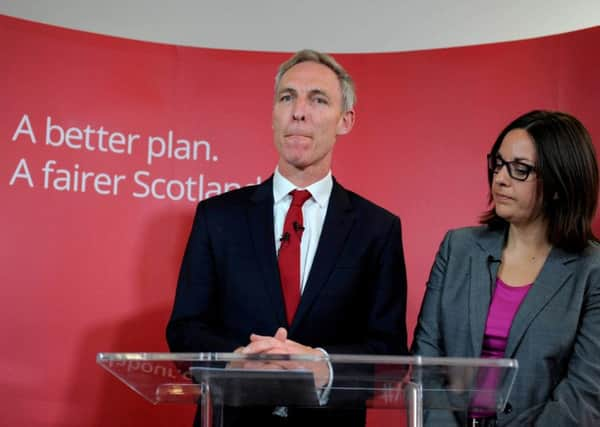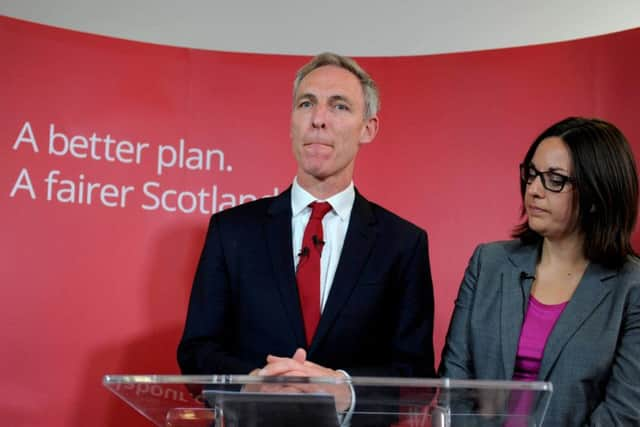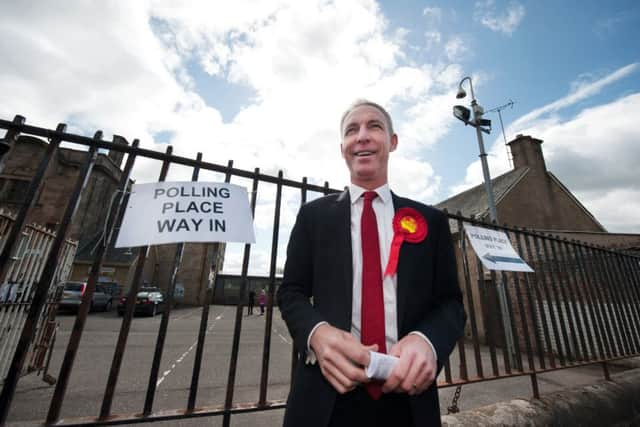Jim Murphy defiant in face of resignation calls


His party has been left with just one MP north of the border, losing 40 seats in a political earthquake which saw the SNP win 56 constituencies across the country, including the East Renfrewshire seat Mr Murphy had held since 1997.
Speaking just hours after defeat in his seat, Mr Murphy insisted he wants to stay on as Scottish Labour leader in a bid to address the problems his party faces.
Advertisement
Hide AdAdvertisement
Hide AdMr Murphy said Labour in Scotland had been “overwhelmed by history and by circumstance”, as high-profile figures such as shadow foreign secretary Douglas Alexander and shadow Scottish secretary Margaret Curran fell to the SNP.


He said he stood for the leadership of the party in Scotland last year because, after the loss of two consecutive Holyrood elections and the “emotional hangover” from last year’s referendum, the party faces “the biggest challenge in our 127-year history”.
Mr Murphy insisted: “As leader I wanted to meet these challenges and I still do.”
But already there have been calls for him to resign and, with the Scottish Labour leader now not holding elected office at either Holyrood or Westminster, questions will be asked about how long he can continue in the role.


Ian Davidson, who lost his Glasgow South West seat to Nicola Sturgeon’s party, said Mr Murphy could not now continue as leader.
“He was elected as party leader on the basis that he was an MP. Only MPs and MSPs can stand for the leadership.
“Morally, as the man who has led us to the biggest ever disaster that Labour has suffered in Scotland ... of course he can’t continue.
“The process of rebuilding the Labour Party has got to start with an examination of both personnel and ideas.
Advertisement
Hide AdAdvertisement
Hide Ad“And therefore Jim has got to do the honourable thing and resign. I’m sure once he has got time to reflect, he will do that,” he told the BBC.
Mr Murphy was elected to the post just five months ago, after his predecessor, Johann Lamont, quit, accusing the party in London of treating Scotland like a “branch office”.
Asked today if he still believes he could be first minister after next May’s Scottish Parliament election, Mr Murphy said: “Yes.”
He conceded the election had been “a dreadful night for our party”, but said: “Far worse than that we are waking up on a terrible morning for Scotland and for working-class people across the UK as David Cameron prepares to form another government.
“The friends and colleagues that were defeated last night had been faithful servants to our party and forceful advocates for their constituents.
“But this isn’t about them and it isn’t about us. This isn’t about individual careers, because, while we have lost seats, the thing that hurts most is the loss of hope faced with another five years of a government totally lacking in compassion, and totally lacking in vision.”
Mr Murphy recalled that when he took on the job he said Labour “hadn’t been good enough, we hadn’t been radical enough, we hadn’t reflected the optimism and self-confidence of modern Scotland”.
He said those challenges still remain, adding while Labour had “worked every day to try to turn this round” in the General Election, the party found itself “overwhelmed by history and by circumstance”.
Advertisement
Hide AdAdvertisement
Hide AdMr Murphy stated: “We make no excuses, a party can never blame the electorate, but we found ourselves hit by the perfect storm of three really significant factors.
“Firstly, the simple maths of a Yes vote finding a home in one party versus a No vote spread across three political parties. It is clear that it will be some time before the divisions of the referendum fade into distinction between traditional left and right wing politics in Scotland.
“Secondly, we were hit by two nationalisms, a Scottish nationalism reassuring people that they could vote SNP and get Labour, and an English nationalism, stoked up by David Cameron, warning ‘vote for Labour and you will get the SNP’.
“Unsurprisingly, forced into an artificial contest between English nationalism and Scottish nationalism, many Scots, including many No voting Scots, chose the SNP.
“The third factor is of course the long standing problems that led me to stand for leadership of this remarkable party in the first place.
“We had for too long lacked a clear message, a clear offer, and a continuity of leadership - five leaders in just seven short years.”
He added: “We didn’t have the time nor space to turn that round in that short period.
“Some have said it was an impossible task to turn around all those years of gradual decline in five short months. But it hurts never the less.”
Advertisement
Hide AdAdvertisement
Hide AdWith Nicola Sturgeon’s SNP having sought to portray itself as the party of social justice in Scotland, Mr Murphy said Labour had “been beaten by a party who claimed our heritage, who clothed themselves in our values and copied many of our policies”.
But he stressed: “With less than a year till the Scottish Parliament elections we cannot afford another period of introspection.
“People need us to be what we’ve always been when we’re at our best, which is a voice for working people.”
Ed Miliband said a “surge of nationalism” had overwhelmed the party in Scotland and told his colleagues north of the border he was “deeply sorry” for what had happened.
Mr Murphy was the biggest casualty of the night, his once safe majority in East Renfrewshire - a seat he had held for nearly 20 years - eliminated as Kirsten Oswald swept to victory with 23,564 votes to Labour’s 19,295.
As Labour giants fell across the country - including campaign coordinator Douglas Alexander and shadow Scottish secretary Margaret Curran - the candidate defending the slimmest majority of any Labour MP north of the border produced a small glimmer of good news.
Ian Murray, who held the Edinburgh South constituency, denied claims he had played down his party affiliation on some of the literature.
Asked if the Labour brand had been a negative, he replied: “I don’t think it was.
Advertisement
Hide AdAdvertisement
Hide Ad“I had Scottish Labour emblazoned across all of my leaflets.
“I stood on a very strong platform of the Labour manifesto.”
Asked how Labour could rebuild, he said: “We need to get the passion back into Scottish Labour and start talking about the values that run through us like sticks of rock.”
Mr Alexander, shadow foreign secretary, was unseated by twenty-year-old student Mhairi Black in Paisley and Renfrewshire South. The SNP candidate won 23,548 votes with a massive 27% swing.
Mr Alexander, who had held the seat since 1997 and had a majority of more than 16,000, picked up 17,864 votes.
In a dismal night for Mr Miliband’s party, the SNP also captured Gordon Brown’s former constituency which had been the safest seat in Scotland.
The nationalists easily overturned a majority of more than 23,000 to take Kirkcaldy and Cowdenbeath, held by the former prime minister since it was created 10 years ago.
With the SNP landslide sweeping across Scotland, Labour candidate Kenny Selbie failed to follow in the ex-Chancellor’s footsteps.
He polled 17,654 votes, nearly 10,000 less than nationalist Roger Mullin, who picked up 27,628.